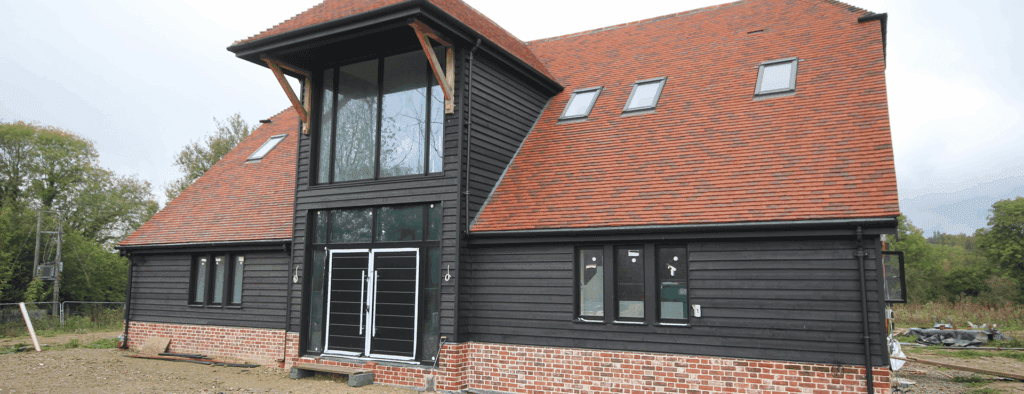UTB has been a ‘reassuring constant’, says Noel Meredith, Director
The economy still looks decidedly fragile, inflation is still above the Bank of England’s 2% target and the mortgage market is operating at a fraction of its pre 2008 levels. However, despite the challenging trading environment a significant number of private developers still see opportunity in the marketplace and are embarking on new projects. Obtaining funding, however, can be a major hurdle.
In August this year we carried out a survey amongst development finance brokers and found that nearly two thirds of them had seen the demand for development finance increase since the start of the year. Unfortunately, little over a third of them had seen the availability of suitable funding increase over the same period. It was encouraging that demand for development finance appeared to be on the up and that was a good indication that developers were gaining confidence and looking to increase activity. However, many were being turned away by their usual lenders, very often their business banks, which had backed them readily enough in the past but had more recently become extremely cautious.
That’s not an unusual scenario. Many lenders have heavily restricted their loans for development finance or have withdrawn from the sector altogether. Some banks that helped their developer customers to acquire sites now find that lending the money to build on them falls outside of their much tougher lending criteria.
Throughout this time United Trust Bank (UTB) has maintained its presence as a lender for good quality residential developments and although some lenders have come and gone UTB has been a reassuring constant in the development finance sector. We continue to see high levels of enquiries and are completing increasing numbers of substantial development loans. However, we don’t lend on every proposal we receive, so why do we fund some projects and not others?
Before 2008, some banks offered development finance to just about anyone who could acquire a site and the services of a builder. The folly of this approach has been well evidenced. Banks now want assurance that their customer is a highly experienced and professional developer. It is not enough to secure the services of a project manager, architect or contractor because, as good as these might be, one of the key drivers of success in the development world is the knowledge and experience of a developer who can conceive the right product and then manage an increasingly complicated delivery process.
Pre credit crunch money was in plentiful supply and some banks were lending ever-increasing proportions of cost. Often, few questions were asked about the borrower’s finances and many banks didn’t seek personal guarantees. Nowadays lenders want to make sure that if anything goes wrong they are not the ones left holding the baby. Lenders expect to get their money back including the interest and fees therefore borrowers should expect to be asked to give personal guarantees. Lenders will also want proof that the guarantors are good for the obligation. This calculation will ignore any investment in the development because if the guarantee gets called the project will already be in trouble.
‘Location, location, location’ is the popular catchphrase of those who believe you can build and sell almost anything if the plot is in the right place. And whilst location is still a key consideration, these days we believe that developers need to be far more focused on what they’re building and who they’re hoping to sell it to rather than just where it is. In short, there needs to be a much greater emphasis on the sector they’re building in.
The developers bringing the most attractive proposals at the moment demonstrate a very high level of local knowledge and expertise at matching the right product with the right buyers in the right locations. In today’s market, where cash and the availability of mortgages are more restricted the most important thing is to establish not just who wants a property but who can afford it.
For example, there may well be a shortage of new flats in a particular location but if incomes in that area do not allow the first time buyers being targeted to fund a deposit then restrictive LTVs (loans to value) on mortgages will hamper sales. The real skill is to establish at the outset of the project which type of purchasers have the desire and the means to purchase and to design developments accordingly.
Lenders will look closely at the local market when deciding whether or not to offer development finance. They look at how busy it is and what type of properties are selling. What the local income levels are and whether potential buyers can afford the deposits necessary to get a mortgage? Unless clear and positive evidence of an active market can be provided, sensible lenders will generally turn proposals away.
Brokers operating in development finance appear to be split over which housing sector shows the best potential for growth over the next three years. According to our own research, nearly a quarter of brokers think first time buyer (FTB) properties offer the best potential for growth with family housing and one-off, individual homes coming in a close second and third. The least favourable sectors according to brokers included luxury flats, retirement housing and eco-friendly developments.
The split in broker opinion is interesting and it’s easy to see why there’s an assumption that the FTB sector offers the best prospects for developers. There’s been a lot of publicity surrounding the need to kick-start the FTB market and I suspect brokers believe that if developers can find a winning formula there’s a ready market for them. However, the stumbling block could still be that younger buyers without substantial funds are barred from entering the property market or making the second step up the ladder because of the unrealistic demands from mortgage lenders for high percentage deposits. If 85% to 90% mortgages become more freely available at competitive interest rates then brokers and developers may well see a surge in the FTB sector, but it’s far from guaranteed.
Developers can find success in most sectors but they need to do their homework. In today’s market the most important thing is not just who wants a property but who can afford it, but that doesn’t mean ruling out luxury homes. High quality individual developments in sought after locations can in some ways be recession proof in that they are aimed at affluent buyers less affected by the ups and downs of the economy or a restricted access to mortgage funds. The target market may be smaller but it can still be profitable for developers able to produce a top quality product.
Our experience of lending on a superb one-off development in Buckinghamshire illustrates my point. Earlier this year we were approached by a broker with whom we’ve had a relationship for nearly 20 years. He was representing an experienced developer who had purchased a site with the help of his clearing bank but between buying the land and commencing the development they had changed their lending criteria and were now unwilling to lend him the money to complete the build.
The project was a beautiful, six-bedroom, six-bathroom house designed to the highest specification. The developer needed to borrow £2m to complete the build. Having been let down by his bank we quickly arranged to meet the developer on site and it was clear that he was man who knew exactly what he was doing. Within a week we’d made a formal offer to lend him the money.
What happened next can only be described as a textbook transaction. The developer was a pleasure to work with, the house was completed on time, on spec and on budget and the finished product was of the highest quality, as you’ll see from the photographs. Within three weeks of being launched to the market the house was sold for just under £4m and the loan was repaid in full on the exact expiry date of the loan agreement.
So why did his own bank turn him down? We can only speculate of course but a combination of stricter lending criteria and a more ‘tick box’ approach to lending with little room for flexibility and creative solutions seem the most likely reasons. That’s one of the key advantages of using a specialist lender with years of experience in development finance. We understand the industry, we understand what a developer needs and we can offer support all the way through the project beyond simply writing out the cheques when required.
Because UTB has tended to lend predominantly in and around London and the South East I am regularly asked if we will lend in other regions such as the North, in the Midlands or in Wales. The answer is yes provided the developer can prove a good demand for the finished product. There are active areas with prosperous populations in all of these areas just as there are some parts of the South that may not be as sought after as others.
When seeking development finance remember that lenders will be interested in three key factors. Does the developer have a successful track record and experience of delivering products suitable for the market? Do they have a good financial standing with a willingness to and ability to provide personal guarantees if required? And is the development well located and aimed at a suitable sector of the market for type and price? If you can answer yes to these three questions a specialist development finance lender will be very happy to talk to you.












